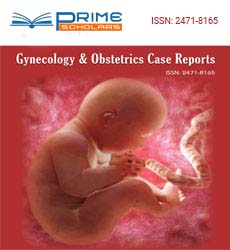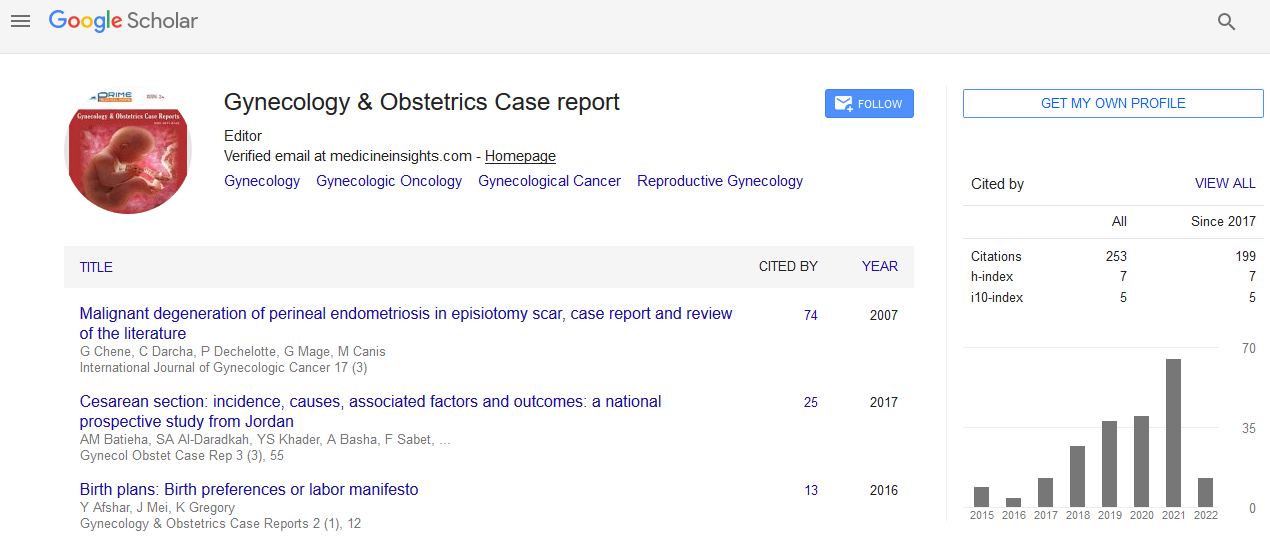Short Communication - (2022) Volume 8, Issue 4
Obstetrics and Gynaecology: Obesity Counselling
Adil Brian and
Nacole Shrin*
Section of Gynecologic Oncology, Stephenson Cancer Center, University of Oklahoma Health Sciences Center, Oklahoma City, Oklahoma, USA
*Correspondence:
Nacole Shrin, Section of Gynecologic Oncology, Stephenson Cancer Center, University of Oklahoma Health Sciences Center, Oklahoma City, Oklahoma,
USA,
Email:
Received: 17-Apr-2022, Manuscript No. IPGOCR-22-13309;
Editor assigned: 19-Apr-2022, Pre QC No. IPGOCR-22-13309 (PQ);
Reviewed: 30-Apr-2022, QC No. IPGOCR-22-13309 (Q);
Revised: 04-May-2022, Manuscript No. IPGOCR-22-13309 (R);
Published:
11-May-2022, DOI: 10.36648/2471-8165.8.4.18
Introduction
Obesity affects 37% of Americans and increases women's
risk of a variety of health issuestreated by obstetricians
and gynaecologists (OB/GYNs), including abnormal uterine
bleeding, infertility, spontaneous abortion, fibroids, urinary
incontinence, pelvic organ prolapse, gestational diabetes, and
preeclampsia. Obesity is also a known risk factor for a variety of
malignancies, including endometrial cancer, but most women
are unaware of this risk. Lifestyle, medicinal, and surgical
therapies that lower a woman's BMI can reduce her risk of
developing health problems [1].
About the Study
The influence of weight reduction therapies on cancer
recurrence and survivorship has been noted in the oncology
sector, and some studies have demonstrated that weight
loss can enhance patient health markers and quality of life
after endometrial cancer therapy. OB/GYNs are particularly
positioned to educate women about the health dangers of
obesity because they care for them throughout their lives.
Obese women should receive counselling and referral services,
according to the American College of Obstetricians and
Gynecologists. Time restrictions, information gaps for obese
patients, patient/provider discomfort with the topic, and
poorly aligned incentives for obesity counselling have all been
identified as significant hurdles to effective counselling and
weight-loss therapies by physicians [2]. OB/GYNs' opinions
toward counselling patients in the outpatient setting about the
health impacts of obesity. Missouri has the 17th highest obesity
rate in the country, and is thus well positioned to study the
impacts of obesity counselling in an OB/GYN population. Our goal was to identify weight control counselling impediments
and ways for overcoming such barriers.
Obesity counselling
In the United States, obesity is an illness that disproportionately
affects women. According to the most recent statistics from the
National Health and Nutrition Examination Survey (NHANES),
the overall age-adjusted prevalence of obesity among women
in the United States was 40.4%, compared to 35% among
males. An analysis of longitudinal data from 2005 to 2014
revealed significant increases in the prevalence of obesity
among women, but not among men. Obesity affects non-
Hispanic black women disproportionately, with an age-adjusted
prevalence of 57%, compared to 38% for non-Hispanic white
women, 46.9% for Hispanic women, and 12% for non-Hispanic
Asian women [3-6]. Obesity has been linked to an increased
risk of cardiovascular disease, type 2 diabetes, and cancer.
Conclusion
Obesity is linked to a high rate of morbidity and mortality, as
well as a variety of female-specific comorbid disorders, and it
affects many women who visit gynaecological clinics. Behavioral
counselling, medication, and bariatric surgery are examples of
evidence-based treatment options that have been found to
reduce weight and obesity-related comorbid disorders. Obesity
in their patients should be addressed by practising obstetric
and gynecologic physicians.
Conflicts Of Interest
There is no conflict of interest to declare.
Acknowledgement
Not applicable.
REFERENCES
- Klein CL, Josephson MA (2022) Post-transplant pregnancy and contraception. Clin J Am Soc Nephrol 17 (1): 114-120.
[Google Scholar], [Crossref], [Indexed at]
- Norwitz ER, Snegovskikh VV, Caughey AB (2007) Prolonged pregnancy: When should we intervene? Clin Obstet Gynecol 50 (2): 547-557.
[Google Scholar], [Crossref], [Indexed at]
- Doherty L, Norwitz ER (2008) Prolonged pregnancy: When should we intervene? Curr Opin Obstet Gynecol 20 (6): 519-527.
[Google Scholar], [Crossref], [Indexed at]
- Makins A, Cameron S (2020) Post pregnancy contraception. Best Pract Res Clin Obstet Gynaecol 66: 41-54.
[Google Scholar], [Crossref]
- Festin MP (2020) Overview of modern contraception. Best Pract Res Clin Obstet Gynaecol 66: 4-14.
[Google Scholar], [Crossref], [Indexed at]
- Cwiak C (2020) Contraception for high risk patients. InSeminars in Perinatology 44 (5): 151268
[Google Scholar], [Crossref], [Indexed at]
Citation: Brian A, Shrin N, (2022) Obstetrics and Gynaecology: Obesity Counselling. Gynecol Obstet Case Rep. Vol.8 No.4:18.
Copyright: © Brian A, et al. This is an open-access article distributed under the terms of the Creative Commons Attribution License, which permits unrestricted use, distribution, and reproduction in any medium, provided the original author and source are credited.

